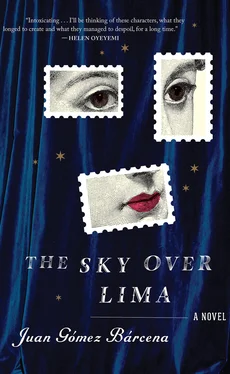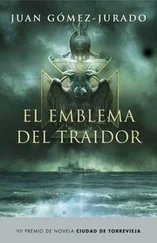Changing the genre. It’s not a bad idea, and Carlos hastens to implement it. His romantic novel briefly takes on tinges of tragedy — of course the real tragedy will come later, though he doesn’t know that yet — and he writes a long chapter, a five-page letter in which Georgina finally bares her soul. It has been so many years, and yet she still cannot get used to the idea that her sister is no longer with them, poor thing — as if Georgina had not spent an entire night beside her white casket, feeling that she too was drowning; as if at the funeral she had not bent over the coffin to kiss her dead sister’s purple lips. That loss had enveloped her in a persistent air of melancholy and guilt — after all, it was she who had asked Teresita to gather lilies from the riverbank. And tisanes and excursions to the seashore and six months in a sanatorium had all been useless against that constrictive pang that still strangles Georgina’s lungs.
The coincidence makes me tremble , the poet replies in the next post, both ashamed and deeply moved. Are you aware that after my father’s death I too was sent off to sanatoriums to purge my soul of sorrows, perhaps the same ones that trouble you?
Georgina is aware of nothing.
◊
For months now Sandoval has been promising a strike that will paralyze all of Peru. The longshoremen in the ports and the railroad engineers rising up as one to tear down the foundations of capitalism together. That strike will never happen, but Sandoval keeps menacing the country with it every afternoon at the club, as if it were only a matter of days or minutes before the social revolution would finally break out. The patrons have learned to listen to his long-winded speeches with skepticism. The ritual is repeated every day with little variation, from the time he rings at the door until he loosens his tie to speak: Sandoval handing the waiter his overcoat, hat, and gloves, conspicuously displaying the ink stains and calluses on his hands, looking for a stool on which to prop one of his boots as he speaks, with the grave and somewhat ridiculous expression of a fencing student preparing to deliver a thrust with his foil. They are studied gestures intended to allow time for interested listeners to approach, but most are already tired of waiting for the strike, the revolution that never comes and that matters to no one. Sandoval, undaunted, keeps preparing harangues that can hardly be heard above the clacking of billiard balls and the clinking of plates against the marble tabletops.
Because the strike, and with it the end of capitalism, is in fact already written. Indeed, everything has been set down in the pages of Bakunin and Kropotkin, so the future of nations holds no secret to men of understanding. In Sandoval’s language, a man of understanding means an anarchist. And that hypothetical anarchist would have only to sit and read the writing on the wall for the future of Peru, and really even the whole world, to be clear to him. Perhaps those assembled would like to hear those predictions?
Nobody answers. Usually no more than seven or eight patrons are sitting in his corner of the room, and they pay him only sporadic attention from behind their unfurled newspapers and glasses of whiskey. Sandoval scans their faces, looking for support, a gesture of approval that might spur on the rest of his speech. Not finding one, he simply keeps talking. It is 1904, he says, and from there he spins off into prophecies based on his theory that all of history’s major milestones occur at five-year intervals. So five years later — which is to say, in 1909—the eight-hour workday will become reality. Ten years — that is, 1914—and a great war will break out among all the world’s nations. A war that will go down in history as the first in which nobody goes off to battle because the proletariat has at last understood that its enemies are not on the other side of the trenches; despite Alsace and Lorraine, the wealthy Frenchman will always, when it comes down to it, be the German capitalist’s brother; similarly, notwithstanding Tacna and Arica, the Peruvian sugar tycoon will always be the friend and compatriot of the Chilean landowner. In twenty-five years — that is, 1929—the mirage of capitalism will collapse in an explosion that will push all the millionaires out the windows. Thirty-five years — that is, 1939—and another war will break out, one in which the proletariat will go to battle because for the first time the conflict will be between social classes, not nations. Forty years — that is, 1944, give or take a year — and the communists will square off against the anarchists for the first time. (We must be honest, Sandoval confesses in a murmur, and recognize that the communists are ultimately just as dangerous as the capitalists, not to mention much more organized.) Eighty-five years — that is, 1989—and the last foundations of communism will be toppled. Just a century from the present day — that is, 2004—and nothing of note will happen; everybody knows that reality rarely indulges in round numbers in producing its significant milestones. A century and ten years — that is, 2014—and anarchism will have managed to vanquish the last of its enemies and will hold sway in the remotest corners of the earth. The end of History.
Carlos is not interested in politics. He’s not really even certain that he knows what terms like anarchism, means of production , and Marxism mean. But there is something in the passion with which Sandoval addresses his audience that he is instinctively drawn to. And so he sometimes pauses in his game of billiards or his conversation with José to listen to Sandoval, to learn, for example, when belief in God will finally die off (around 1969, after the final Catholic council, which will be celebrated in honor of Friedrich Nietzsche). And it is in fact while listening to Sandoval that it first occurs to him that, just as History has an end, so too should their novel, and that dénouement, which he cannot even imagine, fascinates and terrifies him all at once.
◊
Anyone who saw them walking together — from high up in a garret, for instance — would think that they were friends. And perhaps they are. It all depends on whether one believes that friendship between rich men and men who have to earn their living, between protagonists and secondary characters, between young men in linen suits and old men in grease-stained felt jackets, is possible. The two of them, at least, seem to believe in this kind of friendship, and so on some days Carlos accompanies Cristóbal to the tavern to polish off his midday glass of pisco. Alcohol sparks my creativity, the Professor explains, which is why most of my customers show up after lunchtime. People who are in love notice everything, and they’ve figured out I write my best letters when I’m drunk.
When they drink, Carlos is forbidden to mention Georgina. Cristóbal doesn’t like to combine letters with alcohol — that is, work with life. Instead they talk about a great many other things, or rather Cristóbal talks about a great many other things while Carlos listens. He talks about the last covered ladies he met as a child. He talks about the scrivener’s ethic, which is as complex and strict as a priest’s but can ultimately be reduced to a single principle: never, ever swim against love’s tide. He recounts many memorable anecdotes from his professional life, such as the time a young woman asked him to compose a response to the letter he himself had written that morning.
Carlos listens patiently. Perhaps because those anecdotes are helping him write his own novel. Or perhaps because in fact, little by little, they are becoming friends. Or maybe just because the Professor is the only person with whom he feels that Georgina is alive, that in some way she actually exists.
Читать дальше












